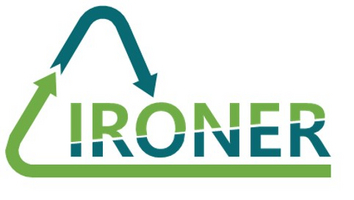Overall approach
The European iron and steel industry is committed to the global climate targets and aims to reduce its production-related CO2 emissions by at least 55% by 2030 (compared to 1990 levels) with climate neutrality by 2050 as ultimate goal (zero CO2 emission from the steel production processes). Steel scrap is an important secondary raw material for steel production and a key pillar within the transition towards a climate-neutral steel industry. The melting of steel scrap requires fewer resources than primary steel production, and thus, enables environmental and economic benefits in terms of CO2 emission and resource demand. Increased and optimized recycling of steel scrap to produce high-performance steels requires precise knowledge of available scrap grades. Particularly old scrap classes often cannot meet the required quality criteria with regard to their composition (e.g., proportions of non-metallic impurities or non-ferrous metals). This induces a currently high export rate, and thus, an exclusion from the material cycle. Environmental protection and circular economy are central topics of the steel sector and require measures and improved technologies for scrap processing to minimize the export of the valuable resource scrap. In this context, IRONER aimed at identifying optimization potentials for a sustainable recycling of steel and at elaborating a catalog of open questions and necessary innovations for an increased steel recycling.
The IRONER consortium comprised leading research institutions for metallurgical process technology, materials development, circular economy, and climate research. The project pursued a comprehensive and application-oriented approach, which included a model-based material flow analysis and stakeholder interview as well as metallurgical and materials engineering considerations. By considering the environmental footprint of steel recycling, emission impacts from increased steel recycling were quantified and economic issues were discussed.
Objectives
IRONER developed a catalogue of open questions and necessary innovations for increased steel recycling. This was achieved by means of a material flow analysis on the availability of scrap, stakeholder interviews with the steel and scrap industry, and the plant engineering sector, as well as accompanied ecological and economic analyses. Additionally, the influences of increased steel recycling on metallurgical processes and the material properties of steel products were considered and evaluated. Ultimately, a position paper was developed to identify necessary research questions. The report can serve as preparation for future national funding initiatives.
Framework
Project timeline:
2022-01-01 to 2022-08-31 (8 months)
Funding scheme:
The project (project number FO999889868) was funded with 100% within the framework of the RTI initiative circular economy (FTI-Initiative Kreislaufwirtschaft). The RTI initiative circular economy is a research, technology and innovation initiative of the Austrian Federal Ministry for Climate Action, Environment, Energy, Mobility, Innovation and Technology (BMK). It is handled by the Austrian Research Promotion Agency (FFG) on behalf of the BMK.
Project consortium:
- ASMET - Austrian Society for Metallurgy and Materials
- Joanneum Research - LIFE - Institute for Climate, Energy and Society
- K1-MET
- Montanuniversitaet Leoben - Chair of Ferrous Metallurgy
- Montanuniversitaet Leoben - Chair of Design of Steels
- Technische Universitaet Wien - Institute of Water Quality and Resource Management
- University of Graz - Wegener Center for Climate and Global Change

 DE
DE EN
EN